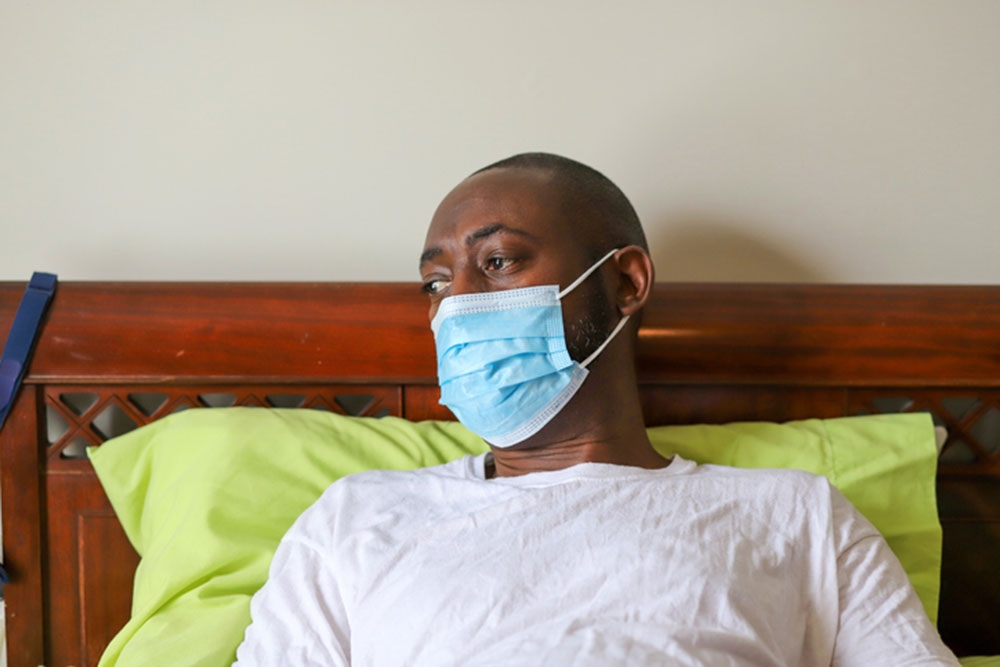
iStock
INVISIBLE DISABILITIES—notably pain and fatigue—can be difficult to measure objectively and are likely to be dismissed by friends, family and physicians. But with increasing numbers of Covid-19 “long-haulers” reporting such symptoms months after acute infection—on top of the extreme contagion and severity of this infection—new attention on such chronic disabilities might help counter what’s called “medical gaslighting.”
“My first symptom was that I couldn’t read a text message,” post-Covid patient Hannah Davis told Live Science. “Brain fog,” general cognitive dysfunction and trouble concentrating, were the prominent complaints from nearly 70% of 640 respondents in a patient-led group’s survey of long-haulers.
Notably with Covid-19, the different experiences of women vs. men— for both acute infection and lasting symptoms—has challenged the traditional approach of “bikini medicine,” which views female patients as interchangeable with male ones, “except for the organs covered by swimwear,” Tulane researcher Franck Mauvais-Jarvis told the Washington Post.
Following infection with Covid-19, women are more likely to suffer long-lasting symptoms—perhaps due to their more strenuous immune-system reactions to the initial infection. But the weaker immune responses of men may explain why their symptoms in the acute stage are more severe: by mid-October, 17,000 more men than women had died from this coronavirus.
(Another reason men might be more susceptible to severe Covid-19 is the much-higher levels of auto-antibodies to immune system proteins called interferon—in 12.5% of severely-ill men but only 2.6 percent of similarly ill women—that can help fight the infection.) Eventually, early screening could lead to different treatment for such patients.
Experts suspect that women’s stronger immune reaction to infection may result in lasting immune dysfunction or auto-immunity, causing symptoms similar to those following other infections—SARS, Ebola and Lyme Disease—in the same way women are more likely to suffer autoimmune diseases like lupus (nine times as many women as men) and multiple sclerosis (three times as many women).
Lyme Disease, for example, has led to persistent symptoms—excessive ongoing swelling of the joints and pain, nerve damage (neuropathy), severe fatigue, sleep disturbance and cognitive problems—in 10-20% of acute Lyme sufferers, lasting months or years following treatment but still doubted or dismissed by many physicians.
“Post-treatment Lyme Disease Syndrome is a real disorder,” says director of the Johns Hopkins Lyme Disease Clinical Research Center John Aucott, “that causes severe symptoms in the absence of clinically detectable infection.”
Following Covid-19 infection, the CDC found about one-third of younger patients with mild symptoms have ongoing problems, especially with periodic shortness of breath and exhaustion, for two to three weeks after infection—and some for six months or longer. Many of those who survive critical illness suffer post-intensive care syndrome (PICS), in particular following prolonged periods of time on a ventilator, heavy sedation and acute respiratory distress syndrome—fluid build-up in the lungs causing low blood oxygen levels.
“People are aging decades in the course of months, said Diana Berrent, who founded Survivor Corps—with membership currently over 100,000 to connect those who have been infected with Covid-19.
One beneficiary of intense post-Covid study is Edison Chiluisa, age 51, profiled in a recent Washington Post article, whose symptoms arose following severe infection in May and still plagued him by mid-October. Working at Yale-New Haven Medical Center, Chiluisa received care at one of the country’s proliferating post-Covid-19 Recovery programs.
An MRI of Chiluisa’s brain showed tiny lesions on the white matter that may be responsible for new stuttering as well as memory problems, insomnia, depression and other symptoms that resemble post-traumatic stress disorder. Such symptoms could be permanent, progressive or something the brain can work around by creating new pathways.
For his other symptoms—racing heart, and becoming easily winded and quickly exhausted —while tests have been mostly normal, Chiluisa has benefited from exams by clinic specialists, searching for causes that might include disruption in the autonomic nervous system—which controls functions such as heart and respiratory rates—or lasting damage due to immune and inflammatory responses in the acute stage.
While Operation Warp Speed continues aiming for a pre-election vaccine, the WHO warns younger people not to expect sufficient vaccine supplies before 2022. And as long as any group fails to receive vaccine protection, risks will continue for more vulnerable and older age groups: recently a 13-year old with no symptoms other than nasal congestion infected 11 family members, ages 9 to 72, in a shared vacation house.
With around 8.5 million Covid-19 sufferers in the U.S. to date, even if the percentage with long-term symptoms is small, those numbers could mount up. And many people with other post-infection syndromes, as well as those with hidden “nonmobility” symptoms from other causes, could benefit from the new attention, both financial and scientific.
After I spent several weeks with untreated, acute Lyme disease, doctors dismissed my newly interrupted sleep as a natural problem of aging, and my suddenly skyrocketing cholesterol as a result of diet, which had not changed. Only my complaint of peripheral neuropathy (dysfunction in peripheral nerves, usually in the legs and feet) received serious attention—because objective tests, notably a little plastic toothpick, could measure 50% loss of feeling in my feet
—Mary Carpenter
Well-Being Editor Mary Carpenter keeps us updated on Covid-19. To read more of her posts, click here.

I really liked Mary’s column this morning! She does a very thorough job, but always with an interesting angle or twist I’d not considered before.
I depend on Mary Carpenter to keep me updated on Covid-19… another good article!
Mary
Another great synopsis of post viral syndromes. Thank you. I had untreated Lyme, exacerbated by a mycotoxin exposure. It’s been quite a chore regaining my health these last few years. If not for my brilliant Functional Medicine physician, and the innovative treatments he prescribed, I’d have accepted chronic disability as my fate and given up trying to feel better. For women, working with the right team of health coaches, is the key to recovery after an immunological injury.